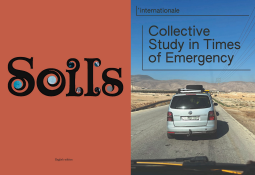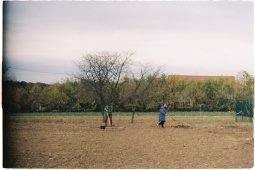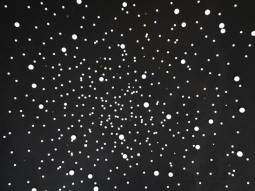Mihaela Moldovan: The Endless Thread of Hope

tranzit.ro/București and The Last Archive present:
Mihaela Moldovan: The Endless Thread of Hope
21 December 2024, 2-6 p.m.
A temporary intervention at the Experimental Station for Research on Art and Life
Int. Primaverii no. 10, Silistea Snagovului village
GPS Coordinates
A ball of straws is wrapped in a lacery made from fragile but strong cord, bringing together the organic and modest material that forms the core of the work and the thread as a long-standing symbol of connectedness in the world and to the other layers of life. Situated in the field and interacting with the natural elements, the object becomes a small sun fallen on the ground, a glimmer of colour and hope during the short winter days. Gradually, surrounded by the growing vegetation in spring and baked by the real sun in summer, the ball of straws and string will become and belong to the earth, will disappear into the landscape which, for a short while, it had attempted to treat as an upside down sky.
read more /
L’Internationale presents two new publications: Soils & Collective Study in Times of Emergency

L’Internationale presents two new publications:
Soils
internationaleonline.org/publications/soils
Soils was published on the occasion of the eponymous exhibition at the Van Abbemuseum.
Soil is a strong and resistant material. It is alive, it breathes, and it can recover. In this exhibition, soil is seen as both matter and metaphor. For some, soil is used as an artistic vehicle. For others, soil is a metaphor for the possibility of not only resistance but also the re-existence of under-standing about our relations with the Earth today.
This book is a reflection on the Soils exhibition in the Van Abbemuseum. The exhibition was five years in the planning and the book leads you through the various phases of its realisation. Alongside a rich selection of images, it includes texts by the three curators, artists and key interlocutors: Teresa Cos Rebollo, Zena Cumpston Charles Esche, Wapke Feenstra/Inez Dekker, Victoria Lynn, Struggles for Sovereignty and Rolando Vazquez.
The Experimental Station for Research on Art and Life had a small display presented in the Soils exhibition, curated by the Resurrection Committee (Adelina Luft, Ovidiu Țichindeleanu, Raluca Voinea), with contributions from Anonymous artist (Transylvania, 19th century), Adelina Ivan, Anang Saptoto, Eduard Constantin, Livia Pancu.
vanabbemuseum.nl/en/see-and-do/exhibitions-activities/soils
Collective Study in Times of Emergency
internationaleonline.org/publications/collective-study-in-times-of-emergency/
read more /
News from the Station

Dear friends, followers and distant readers,
It has been a tough year for us at the Station: drought, sorrow, building work advancing too slowly and older age settling in too quickly. Yet: the plants we saved from being completely scorched, the vegetables that our neighbours still managed to harvest, the new neighbours who did not let themselves discouraged and joined us on the lands nearby the Station, the friends who came to plant and the new visitors who came to listen, what we did manage to build, the allies and peers from distant places, the sunsets and the green grass emerging after the rain, the insects we didn’t have last year, the lizards called Sam, they were all so many reasons for encouragement, helping us to counter the agenda of doom guiding life in other places, close and afar.
December should have been a time of celebrating our collective survival for another year, instead, we find ourselves stranded in the only territory that still feels safe for the moment: our imaginary of hope, our horizon of trust in people’s desires for the common good rather than for the individual capitulation in front of the apocalypse. We (people at and around the Station, birds, artichokes, insects, lizards, stray dogs and more) think this territory can be as wide as we want to stretch it, as fertile as we struggle to irrigate it, as welcoming as we dare to make it.
read more /
Reading Evald Ilyenkov

Friday, 22th of November 2024
tranzit. ro/Cluj,
Napoca str, no 16, 1st floor, Cluj Napoca
Evald Ilyenkov (1924-1979) is the most important Soviet Marxist philosopher of the postwar. He has written on a large gamut of subjects, from problems of theoretical philosophy, theory of knowledge, the concepts of the “abstract” and the “concrete”, the “ideal”, and the universal, to Marx’s materialist dialectical method in Capital, problems of cybernetics, automation, machine-thinking, to problems of pedagogy, theory of education, psychology, human mind, and ethics and aesthetics. Ilyenkov can be considered the philosophical originator of what is known as “activity theory” in the Soviet Union, which in its turn precedes what is known as Cultural-Historical Activity Theory internationally nowadays. The concepts, ideas and theories of Ilyenkov have influenced generations of younger philosophers from the 1950s to present in Eastern Europe, while recently enjoying an increased attention in the anglophone world.
The aim of these monthly reading seminars is to closely familiarize the participants with the key concepts and theories developed by Ilyenkov with the hope of utilizing them in the face of contemporary polycrisis.
read more /
Observator

Group exhibition: November 9, 2024 - January 31, 2025
Public presentation and public reading:
Saturday, November 9, 5 p.m. / Sf. Atanasie Street no. 25, Iași (tranzit.ro/ Iași)
Exhibition opening:
Saturday, November 9, 7 p.m. / Sf. Atanasie Street no. 25, Iași (tranzit.ro/ Iași)
On November 9, the Observator group exhibition opens in Iași, organized in the frame of the cultural project with the same name. The exibition presents contributions by Astronomical Observatory in Bârlad & Ciprian Vîntdevară (RO), Mona Vătămanu & Florin Tudor (RO), Andreea Cioară (RO), Edi Constantin (RO), Nebojsa Milikic (SRB), Ana Maria Micu (RO), Mălina Moncea (RO), Andrei Nacu (RO/UK), Tudor Pătrașcu (RO), Maxim Polyakov & DRUJBA (MD), s.a.b.a. Silvia Amancei & Bogdan Armanu (RO), Kristin Wenzel (DE/RO), Ovidiu Țichindeleanu (RO/DK). The group exhibition is curated by Florin Bobu & Delia Bulgaru and can be visited until the end of January 2025.
read more /
Some of Us Did Not Die
Autumn planting workshop /

Saturday, 9 November 2024, 11 to 5 p.m.
The Experimental Station for Research on Art and Life,
Intrarea Primaverii no. 10, Silistea Snagovului village, north of Bucharest, Romania
GPS coordinates
In Autumn 2022 we planted the first trees of the Cosmos Garden, when the war in Ukraine was still in its early days and the earth was sending vibrations of the bombs falling and the ecocide in progress. In Autumn 2023, after the 7th of October attack of Hamas and the ensuing massacre of Palestinians, turned into an ongoing genocide, we were planting fruit trees that were to become an orchard of hope. Apricot, pear, sour cherry, almond and quince trees. In Jewish Palestinian Aramaic language, quince was known as the miraculous fruit. In Autumn 2024, while Lebanon is being bombed, we organise another collective planting session. We will plant a Lebanese cedar, more fruit trees including a quince type named Constantinople, grape vine and others.
With the privilege and responsibility of being still alive, we continue to plant life and to cultivate hope, even when reason itself turned against it.
read more /
Results of Artist-in-Residence programme at Q21/MuseumsQuartier in Vienna in 2025

Congratulations to all artists and curators who will participate in the MQ - MuseumsQuartier residency program in Vienna in 2025!
From July-August 2025 MQ - MuseumsQuartier in Vienna will be happy to host 𝐃𝐚𝐧𝐚 𝐀𝐧𝐝𝐫𝐞𝐢 from Romania.
The Artist in Residence Programme at MuseumsQuartier in Vienna is part of ERSTE Foundation’s long-term endeavour to support contemporary art and to strengthen the fragile situation of its creators, especially in the region of Central, Eastern and Southeastern Europe.
The residency programme is carried out in close cooperation with ERSTE Foundation's key cultural partners: tranzit, Igor Zabel Association and Kontakt Collection (Kontakt Collection will collaborate with the Zagreb based WHW Akademija.) Thus, the residencies are aimed at artists and curators from Croatia, Czech Republic, Hungary, Romania, Slovak Republic and Slovenia working in the field of critical contemporary visual art to do research in their respective area.
read more /
Power Lies in Togetherness
Statement by tranzit.org /

tranzit.org stands by the cultural workers and citizens of Slovakia in their efforts to safeguard the independence of culture and democratic values! We believe in the power of solidarity and acting together for a more sustainable and just world!
We hereby launch a call for international solidarity with Slovak Culture and cultural workers!
Let’s use our networks to spread the word, raise our voices and put an end to the devastation of culture in Slovakia!
Let’s support our colleagues from Slovakia in their struggle within the Cultural Strike!
read more /
Images of the Good Life in the East
Exhibition and Forum /

Chișinău, 14-28 September 2024
Exhibition participants: Darya Tsymbalyuk, Ghenadie Popescu, Maria Doni, Marina Sulima, Nikita Kadan, Pavel Brăila, Tatiana Fiodorova, Alexandra Tatar, Ana Barbu, Ana Kun, Andrei Nacu, Catherine Morland, Daria Nedelcu in collaboration with Cyrill Lim, Jo Brăilescu, Irina Botea & Jon Dean, Lilia Nenescu, Maria Mora in collaboration with Tudor Vlădescu, Paula Dunker, Raluca Popa, Silvia Dogaru
Exhibition venues: Bunker, Lutnița, Zpațiu
Opening: 14 September 2024
Forum participants: Charles Esche (online), Corina Oprea (online), Elena Crippa, Irina Cios, Magda Radu, Miki Braniște (online), Sara Buraya, Theo Prodromidis, Zdenka Badovinac (online), Diana Munteanu, Lilia Dragneva, Nora Dorogan, Octavian Eșanu (online), Pavel Brăila, Rusanda Curcă, Ştefan Rusu, Tatiana Fiodorova, Valeria Barbas, Vitalie Sprînceană, Vladimir Us and others
National Art Museum of Moldova
15 September 2024
Curators: The Resurrection Committee (Adelina Luft, Nora Dorogan, Ovidiu Țichindeleanu, Raluca Voinea)
From 14 to 28 September 2024 the project “Images of the Good Life in the East” will take place in Chișinău, organized by tranzit.ro/Bucharest in partnership with teatru-spălătorie, Ksak Association (Center for Contemporary Art Chișinău) and Bunker space, Lutnița gallery, Zpațiu, and The National Art Museum of Moldova. Curated by Adelina Luft, Nora Dorogan, Ovidiu Țichindeleanu, and Raluca Voinea, the project consists of an exhibition in the partner spaces with an opening on 14 September, and a public forum at the National Art Museum of Moldova taking place on 15 September.
The exhibition brings together artists from Moldova and Ukraine: Ghenadie Popescu, Marina Sulima, Tatiana Fiodorova, Pavel Brăila, Darya Tsymbalyuk, Maria Doni, Nikita Kadan, together with 14 participants from the independent course “Non-Western Technologies for the Good Life” (October 2023 - May 2024): Alexandra Tatar, Ana Barbu, Ana Kun, Andrei Nacu, Catherine Morland, Daria Nedelcu in collaboration with Cyrill Lim, Jo Brăilescu, Irina Botea & Jon Dean, Lilia Nenescu, Maria Mora in collaboration with Tudor Vlădescu, Paula Dunker, Raluca Popa, and Silvia Dogaru.
read more /
POLYCRISES ACROSS DIVIDES

29 - 31 August 2024
Historical Materialism Cluj/Kolozsvár 2024
The first edition of Historical Materialism Cluj/Kolozsvár will take place between 29-31of August 2024, in Cluj-Napoca:
https://hmcluj2024.conference.ubbcluj.ro/
Open call for participation
1st of February - 1st of April 2024
The conference is organized by the Babeș-Bolyai University in partnership with Historical Materialism: Research in Critical Marxist Theory and tranzit.ro/Cluj.
read more /
Marxism & Ecology Summer School
CALL FOR PARTICIPATION now open until the 15th of May /

Câmpu Cetății, Mureș County, Romania
𝐓𝐡𝐮𝐫𝐬𝐝𝐚𝐲 𝟐𝟐𝐧𝐝 𝐀𝐮𝐠𝐮𝐬𝐭 𝐭𝐨 𝐓𝐡𝐮𝐫𝐬𝐝𝐚𝐲 𝟐𝟗𝐭𝐡 𝐀𝐮𝐠𝐮𝐬𝐭 𝟐𝟎𝟐𝟒
With 𝐓𝐫𝐨𝐲 𝐕𝐞𝐭𝐭𝐞𝐬𝐞, 𝐊𝐚𝐭𝐡𝐚𝐫𝐢𝐧𝐚 𝐇𝐮𝐧𝐟𝐞𝐥𝐝, 𝐀𝐭𝐭𝐢𝐥𝐚 𝐒𝐳𝐢𝐠𝐞𝐭𝐢 and 𝐠𝐮𝐞𝐬𝐭𝐬
Call for Participants open until the 𝟏𝟓𝐭𝐡 𝐨𝐟 𝐌𝐚𝐲 𝟐𝟎𝟐𝟒.
It is easy to grow numb to the litany of environmental devastation in recent years. The SARS-CoV-2 pandemic killed thirty million people; atmospheric CO2 stands fifty per cent higher than two centuries ago (currently 423.6 ppm); wildfires rage in Chile and Argentina, while 11,300 people were killed by an overnight flood in Derna; less than a tenth of the world’s plastic is recycled; over 75 billion livestock animals are killed every year; the number of coastal ‘dead zones’ increased from 10 in 1960 to 415 in 2023; the US government declared twenty-one species formerly found in its territory extinct in 2023. One can go on, and on, and on.
At the same time, the last thirty years has seen the development of sophisticated radical critiques of environmental degradation and the ‘capitalocene’, the need for struggle to achieve transformation in response to the continued failure of centrists to achieve meaningful reform.
read more /
The Artist-in-Residence Programme at MQ21/MuseumsQuartier in Vienna
CALL FOR APPLICATIONS open until September 15th, 2024! /

The Artist in Residence Programme at MuseumsQuartier in Vienna is part of ERSTE Foundation’s long-term endeavour to support contemporary art and to strengthen the fragile situation of its creators, especially in the region of Central, Eastern and Southeastern Europe.
read more /
